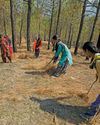
Gravitational waves-ripples in space that stretch and squeeze everything in the universe were detected first in 2015 and have been noted about 100 times since then. But the gravitational waves detected were only of high frequencies and short wavelengths, indicating the relatively minor events that caused them, such as collisions of small black holes or dead stars. The latest detection is of gravitational waves of low frequency and long wavelength (running into lightyears), which indicates that their sources are perhaps some of the universe's biggest objects-supermassive black holes billions of times the mass of the Sun.
Scientists tracked these massive gravitational waves by monitoring for 15 years an array of pulsars-dead stars that emit radio waves as they spin with such exceptional regularity that scientists know when the radio waves are supposed to arrive on Earth. As gravitational waves warp space, the distance between these pulsars and the Earth changes, altering the arrival timing of the radio waves. By tracking the pulsars, scientists could infer that they were hit by gravitational waves. This method did not reveal which black hole collisions or exploding supernovae caused them. But it did indicate that they were coming from not one but many such events, a kind of perpetual background "hum" going on in the universe. The findings could mean that there are more (or larger) of such gargantuan objects and events than scientists had thought of, or maybe there are sources of gravitational waves that remain unknown. India's Giant Metrewave Radio Telescope in Pune was one of the world's six telescopes used in the study. GOPAKUMAR ACHAMVEEDU, professor of astronomy and astrophysics at Mumbai's Tata Institute of Fundamental Research, and one of the researchers involved in the international collaboration, talks to ROHINI KRISHNAMURTHY about the findings. Excerpts:
Denne historien er fra July 16, 2023-utgaven av Down To Earth.
Start din 7-dagers gratis prøveperiode på Magzter GOLD for å få tilgang til tusenvis av utvalgte premiumhistorier og 9000+ magasiner og aviser.
Allerede abonnent ? Logg på
Denne historien er fra July 16, 2023-utgaven av Down To Earth.
Start din 7-dagers gratis prøveperiode på Magzter GOLD for å få tilgang til tusenvis av utvalgte premiumhistorier og 9000+ magasiner og aviser.
Allerede abonnent? Logg på

THE CIRCULARITY ARGUMENT
A circular economy can help India achieve its developmental aspirations while following the low-carbon pathway. It will also help address the challenges of waste management, pollution and overexploitation of natural resources. Industries are already innovating to reuse high-volume wastes and have shown that the transition can usher in both environmental and financial windfalls

Banking on flawed drug voluntary licences
The Medicines Patent Pool is pushing for more VLs, but its bad deal with Novartis on a cancer drug shows the pitfalls

Lasting solutions
For the first time, the UN has recognised the role of indigenous communities in tackling aridity. A repository of traditional knowledge India has the wherewithal to lead the way

IMD at 150
India's journey into modern weather forecasting took a decisive turn 150 years ago with the establishment of India Meteorological Department during the British rule. The agency has come a long way since then, shaping the way the country predicts and responds to its diverse climate challenges

Every drop counts
In drought-prone Marathwada region, 14 villages have managed to counter water shortage by budgeting the resource

Threat to survival
Hollongapar Gibbon Sanctuary in Assam faces ecological challenges as railway electrification and hydrocarbon exploration endanger its fragile biodiversity

'Migration is going to be a battlefield'
AMITAV GHOSH is one of the foremost chroniclers of our times. His literary sojourn includes writings on topics that range from languages to climate change to human lives. His latest book, Wild Fictions, brings some of his works on these issues under one title. In a conversation with RAJAT GHAI, Ghosh shares his views on the future of human movement. Excerpts:

Face of future
California wildfires confirm forest fires are intensifying in a hotter world, emitting substantial amounts of greenhouse gases and reinforcing global warming

Friends of the forest
Residents of 30 villages in Uttarakhand establish a model for public participation in saving forests from wildfires

Climate-crazy playbook
Just hours after his second (and final) term began on January 20, US President Donald Trump unleashed 46 presidential actions. Several of these are centred on the US' climate commitments, energy transition, migration and trade policies, and are likely to have negative global implications